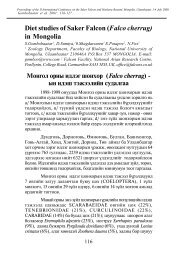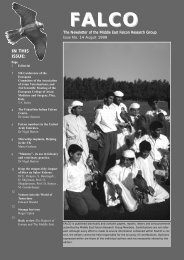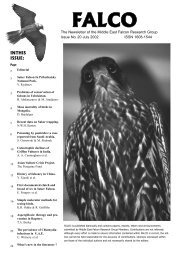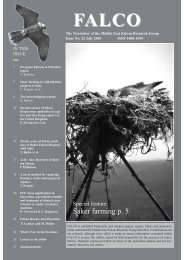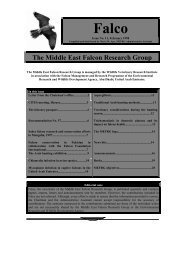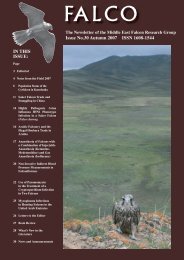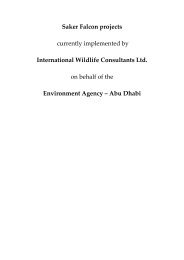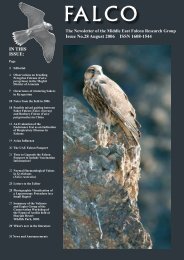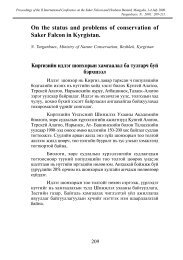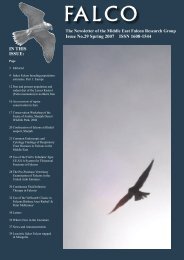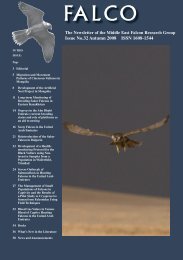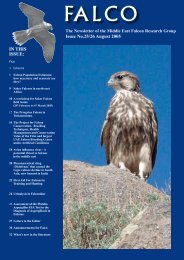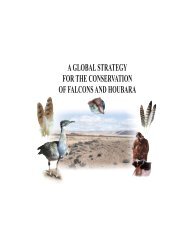Falco 27 - International Wildlife Consultants Ltd.
Falco 27 - International Wildlife Consultants Ltd.
Falco 27 - International Wildlife Consultants Ltd.
- No tags were found...
Create successful ePaper yourself
Turn your PDF publications into a flip-book with our unique Google optimized e-Paper software.
Letters:The use of avian influenza vaccines in falconsDear Colleagues,There has been considerable interest in the use ofavian influenza vaccines in falcons in the UnitedArab Emirates. Many veterinary centres are using theIntervet H5N2 vaccine on captive falcons. There isnow a proposal to use a ‘Chinese H5N1 vaccine’ infalcons in the United Arab Emirates. The use of avianinfluenza vaccines in falcons raises a number of issues.I feel it is important to highlight specific concerns tostimulate debate, with the aim of reaching a consensusamong clinicians involved in the UAE falconry scene.Questions:n Has the vaccine any side effects when used in falcons,for example does it reduce flying performance ordoes it stimulate amyloidogenesis in gyr hybrids?n The H5N2 vaccine has been used on valuable birdsof a variety of species. Not all species respond tothe vaccine. Do falcons respond to vaccination?Does the H5N2 vaccine offer effective protectionagainst H5N1 or does it induce partial protectionallowing amplification of the virus?n Only a few cases of H5N1 have been documentedin raptors, are they naturally resistant to clinicaldisease? Avian influenza (H5N1) is importantbecause it affects humans. Eradication of the diseaseis preferable if possible. <strong>Falco</strong>ns are expensive, butI am confident that the Shaikhs buying the falconsconsider their people more important than the falconsand would cull infected falcons. If falcons cost thesame as chickens would they be vaccinated?n Would it be prudent to conduct a serological surveyon falcons to assess previous exposure to H5N1?n Reference laboratories should be able to differentiateantibody titres between vaccinated falcons and thosethat have been naturally exposed to the virus. Canthis testing be performed routinely in the UnitedArab Emirates? The current blood screening testsused at UAE Ministry of Animal Wealth quarantinefacilities cannot do this, which calls into questionthe efficacy of quarantine facilities for falcons.Until laboratories in the Middle East are equippedto differentiate between falcons that have beenexposed to infection, as opposed to falcons thathave been vaccinated, the international movementof falcons is compromised.My view is that because H5N1 has not been detectedin UAE there is no need for widespread vaccinationof falcons. I would support a vaccination trial on acontrolled, isolated, experimental group of falcons,which would provide information on the efficacy andsafety aspects of vaccination.The use of unlicensed avian influenza vaccines mayhave legal and international implications. I would urgeclinicians to obtain permission from the governmentveterinary authorities, before these vaccines are used.I trust this letter stimulates discussion on the topicand also helps clinicians develop an agreed protocoltowards Avian Influenza vaccination in falcons in theEmirates.PeterMcKinney. MBV MRCVS CertZooMedAustralian Raptor Conservation TrustEditors note:There are many different opinions on the issue of vaccinationof falcons against avian influenza. We hope to report someof the serology results from vaccinated falcons in the nextissue of <strong>Falco</strong>.Avian influenza in Saudi falconsDear Sir,I am writing to inform you that we had the first confirmedcase of avian influenza subtype H5N1 in Saudi Arabia.This was a Saker <strong>Falco</strong>n (<strong>Falco</strong> cherrug) that had beenin the country for the past 2 years. The bird arrivedfor a general check up with a history of anorexia oftwo days and passing green faecal. We conducteda complete check up on the bird including physicalexamination, endoscopy of the upper GIT, radiographsand haematology. The bird was diagnosed undergoingan acute viral infection (Newcastle disease was assumedat the time) as suggested by the haematology results,clinical signs and medical history.The falcon was placed in an isolation room, but diedovernight. The following day the falcon underwent afull post-mortem examination. Tissues were collected,both fresh and frozen. Samples were sent to the CVRLin Dubai for virus isolation. A few days later it wasconfirmed that the falcon had died of avian influenzaand samples were sent to the national avian influenzareference laboratory in Germany for further testing.The sample tested positive for H5N1.The case has been reported to the Saudi authorities whoare responsible for reporting notifiable diseases to theOffice <strong>International</strong> des Epizooties and World HealthOrganisation.I advise my colleagues working in falcon hospitals inthe region to be very vigilant and to implement strictbiosecurity programmes at their premises, particularlywith any wild caught birds coming from influenza‘hotspots’.Dr Jaime Samour21



